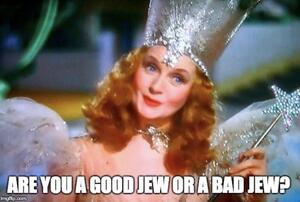Are you a Good Jew or a Bad Jew?
One of the most shocking moments of my young Jewish life was when my father told me that some people do not use electricity on Saturdays.
This was when I first discovered that some people were more observant of halacha(Jewish law) than my family and I. We had just had our Shabbat dinner, and the next morning we would drive to synagogue. My parents mentioned that another family we knew walked there, and then explained to me that some people don’t drive on Shabbat. “You know how we don’t use lights on Yom Kippur? Some people do that every Saturday,” my father said. This led to my learning that people keep stricter kosher than our “kosher style” of not having shellfish, pork, or mixing meat and dairy.
I was horrified. “You mean, we aren’t following all the rules?” I instantly felt inadequate that other people were “better” at being Jewish than I was. I had previously felt pride in my family’s Shabbat routine, and secretly felt better than my friends at school who ate cheeseburgers. Yet I now had a group of Jews whom I felt inferior to. My practices felt like a liminal space—Jewish, but not “Jewish enough.”
This fear, of “not being Jewish enough,” is common. When I tell people I want to go to rabbinical school, they instantly turn the conversation into a Jewish confessional: “I haven’t been to synagogue since my bat mitzvah. I eat pork. I don’t know if I believe in God. I barely remember Hebrew.” They disclose these behaviors as if expecting me to take away their “Jew card” right then and there.
Of course, the complexity and totality of what it means to be Jewish can’t be condensed into a litmus test of who eats pork and who doesn’t.
This anxiety of “am I Jewish enough” is part of a larger historical problem, one of power dynamics and exclusionary politics. I look to the long history of women not being counted in a minyan, being unable to enter the rabbinate, and receiving an unequal Jewish education. I also look at patrilineal Jews’ and converts’ struggle to be recognized by Jewish institutions.
The “right” or “wrong” way to be Jewish has long been a narrative controlled by those in power. Those in power have historically been the cisgendered men who interpreted law and defined what was normal and spiritually appropriate.
Class dynamics also determine who receives Jewish social capital. Jewish institutional knowledge requires access to Jewish resources and educational opportunities. For instance, Jewish day school tuition was too expensive for my family, but we had enough privilege to afford synagogue membership and Hebrew school fees. While I have a stronger Jewish background than others, not having the opportunity to attend Jewish day school deprived me of Hebrew proficiency and a more comprehensive understanding of Jewish text and law.
But: I am not any less Jewish than someone who received this education.
By rejecting the framework of a “right” way to be Jewish, I have allowed myself to accept that there are many valid Jewish backgrounds and lifestyles. This has allowed me to slowly overcome my sense of both feeling superior to others’ practices and shame at not being “Jewish enough.”
I have altered my language, asking “what is your Shabbat practice?” instead of “do you ‘keep Shabbat’?” This shift recognizes that there are ways to honor Shabbat other than a strict halachic observance. Personally, I set aside the day in whatever way feels right––some weeks this constitutes unplugging my devices, while for others it’s simply not doing schoolwork on Saturdays or setting aside a Friday night for myself. These actions all constitute a Shabbat practice because I am doing what I need to in order to separate the day.
This year, I broke my traditional Rosh Hashanah practice and listened to music on my phone. I did what I needed to do in order to feel present, happy, and relaxed. Although not halachic, it was an important part of how I celebrated the holiday.
Yet, one does not need to even have a Rosh Hashanah or Shabbat practice to be Jewish either.
Yes, tradition is an essential part of our faith. A connection to our ancestors keeps Judaism relevant in the face of modernization and growing secularization. By grappling with the conflict between the value that tradition gives us, and the parts of tradition that do not resonate with us, however, it is possible to celebrate the diversity of our people and to allow each person to find a version of their Judaism that feels spiritually significant.
When we let go of the self-conscious idea of being a “good” or “bad” Jew and accept ourselves for who we are, we are better able to truly connect to our faith. This open outlook welcomes all kinds of Jews, removing the boundaries that history has created and helping our diverse and multifaceted community create a more beautiful Judaism.








This is a lovely article. It takes out any judgement and allows me to develop my own relationship with my religion and hashem. Thank you for helping me make sense of my thoughts and to recognize how my shame has been holding me hostage and keeping me out of focus on allowing my own way of being jewish.
Amen.
Thank you Rachel. I call this phenomina "Jew Shame" I felt it myself for many years. Thanks so much for shining a light and helping to make it safe for people to feel Jewishly enough just the way they are.